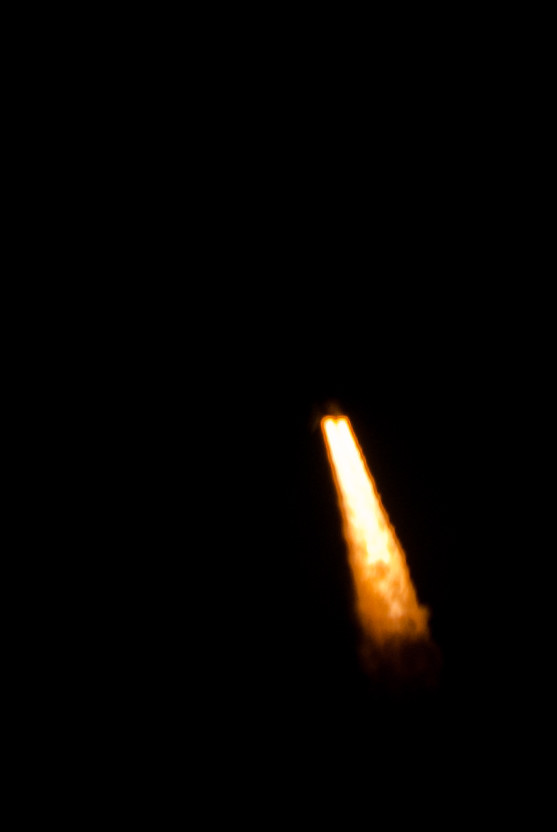
Shuttle Discovery, STS-131 launch, April 5, 2010.
There is more fallout today from the Charles Bolden interview with Al Jazeera.
Yesterday, White House press secretary Robert Gibbs seemed to deny that President Obama had NASA Administrator Charles Bolden had wanted him to reach out to the Muslim world.
Q I wanted to ask you, there are some comments that the NASA Administrator, Charles Bolden, made a couple weeks back that drew some interest, specifically from conservatives who are wondering why we he said that one of the charges that the President gave him when he got the job was that he had to focus on outreach to the Muslim world. Why is the NASA Administrator doing that?
MR. GIBBS: That's an excellent question, and I don't think—that was not his task, and that's not the task of NASA.
Q So did he just misspeak?
MR. GIBBS: I think so.
Q Has the President spoken to him about that clear it up?
MR. GIBBS: No.
Q Anybody here at the White House?
MR. GIBBS: I’m sure people -- people at the White House here talk to NASA all the time.
This was, in my opinion, essentially throwing Bolden under the bus, and it is a very, very bad move. Instead of sticking to its guns, the administration backed away from being linked publicly to very good principles, principles that were part of its very platform—outreach to Muslims, international collaboration, and a commitment to science—all in an attempt to avoid political damage. Now, their attempt to push these policies under the rug is coming back to bite them politically as their opponents are seizing on reports from others in the know who can confirm that these initiatives did exist:
Call it a failure to launch.
The White House is disavowing a plan to have NASA conduct outreach to Muslim countries, but a congressman who talked to NASA Administrator Charles Bolden about that plan last month said the initiative was very real until somebody slammed the brakes on it.
Rep. Pete Olson, ranking Republican on the Space and Aeronautics House Subcommittee, told FoxNews.com that Bolden described the outreach program as part of the administration's space plan during a conversation they had in June.
"He confirmed it to me," Olson said. The Texas Republican said he thinks the program existed until the "uproar" compelled the administration to rethink it.
I think this is more important than I originally thought, because it's now starting to turn on the fundamental debate of what NASA's role should be, and exposing the disconnect between what some people think NASA should do and what NASA actually does.
Policymakers tend to think of NASA primarily in terms of it being a projection of American exceptionalism and a symbol of national prestige. The rationale for supporting NASA, and the politics of it securing funding, revolves around a mentality that dates back to the Cold War—that as the world's leading power, we ought to be leaders in space exploration. It's also a powerful symbolic link to our national historic self-image as frontiersmen and explorers.
But of course, that's not the whole picture. NASA isn't just a space agency; it's also a science agency—like NOAA, like the National Institute of Health, like the US Geological Survey. Like these agencies, it employs scientists and supports thousands more, funding them and providing resources for their experiments and observations.
Just how much? Well, in the 2010 fiscal year, NASA's budget contains just under $4.5 billion in funding in the category of "science". That's pure, unadulterated science—money that goes to funding researchers, to building telescopes, to paying the stipends of graduate students vying to become our nation's next generation of astrophysicists, astronomers, and space scientists (like me). That's as much as got spent on the space shuttle, and almost half as much again ($3.1 billion). It's way more than got spent on the International Space Station ($2.3 billion). And keep in mind, this is before the shuttle program winds down its operations. Next year, when the shuttle is retired, science funding for NASA will surpass its entire space operations budget. Commentators who snark that NASA will then have nothing to do don't understand just how much NASA already does to perform and support pure science.
And so when Charles Bolden talks about collaborating with Muslim nations, it isn't just about sharing engineering expertise—it's also about scientific expertise. It's about nurturing a generation of scientists so that not only are they able to share the fruits of their research with the rest of the scientific community, but also establish themselves as public intellectuals in their own nations, thereby elevating the status of science in their societies.
How exactly does NASA do this? By sharing data. Here's an article from last December:
[NASA assistant administrator of external affairs Michael O'Brien] said Nasa would sign a deal with Oman’s ministry of education that would allow it to take part in Globe, the agency’s environment-monitoring education programme.Do the people who are currently blasting Obama understand that this is what NASA outreach to the Muslim world looks like? Do they really think that this is such a waste of time? Because this is simply NASA upholding its motto: "For the benefit of all."
Saudi Arabia will also sign a deal allowing it to participate in the Nasa Lunar Institute, an exchange programme for lunar research and scientists, this week.
Nasa will also be collaborating with the Arab Youth Venture Foundation, a Ras al Khaimah-based non-profit organisation, to coach Emirati students at the Ames Research Centre in California.
0 comments:
Post a Comment